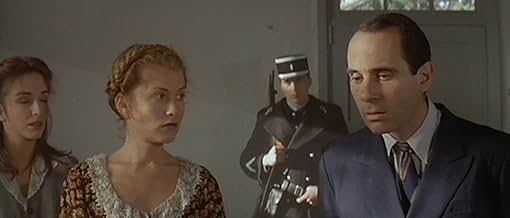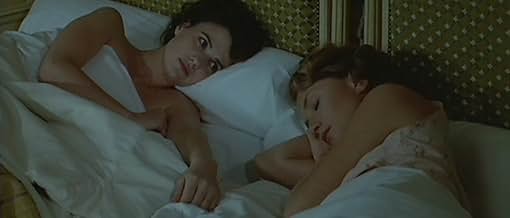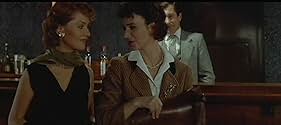Ein jüdischer Flüchtling heiratet einen Soldaten, um der Deportation nach Deutschland zu entgehen. Währenddessen verliert eine wohlhabende Kunststudentin ihren ersten Ehemann durch eine veri... Alles lesenEin jüdischer Flüchtling heiratet einen Soldaten, um der Deportation nach Deutschland zu entgehen. Währenddessen verliert eine wohlhabende Kunststudentin ihren ersten Ehemann durch eine verirrte WiderstandskugelEin jüdischer Flüchtling heiratet einen Soldaten, um der Deportation nach Deutschland zu entgehen. Währenddessen verliert eine wohlhabende Kunststudentin ihren ersten Ehemann durch eine verirrte Widerstandskugel
- Für 1 Oscar nominiert
- 2 Gewinne & 7 Nominierungen insgesamt
Empfohlene Bewertungen
It's 1942. A woman, Léna (Isabelle Huppert), marries a Jew (Guy Marchand) in order to escape deportation from France. Another, Madeleine, (Miou-Miou) loses her lover to an ambush of the Resistance. Their paths will cross ten years late. Now, Madeleine has a new husband, while Léna still lives with Michelle. They are both free-spirited, spontaneous and smart; in short, kindred spirits. So starts a friendship, a bit different from the others. So different, in fact, that it threatens to destroy the marriages of both.
At the time in which the film is set, women in France had few rights and lots of obligations imposed to them by the conservative society. They were responsible for the household, the children (because, of course they had children, how would France get brave sons and nice daughters?), and generally everything except work, which was the man's job. They couldn't even get a car without their husband's permission! It is evident that the two heroine's were oppressed in this society, which expected them to fulfill their role as prudent, responsible wives, without personal desires.
In the 80's, a lot had changed. Women were more independent, they could work without being discriminated against, except for some jobs, were they still faced criticism because of these professions being considered "masculine", like the police (see for this, "La femme flic" by Yves Boisset, also starring Miou-Miou). Women had it better, and so started to examine their position during these decades of oppression that had preceded their own. "Coup de foudre" was a product of this process.
It is interesting to see how Kurys showed these women's position in the society. The heroines are just expected to give up on their dream of opening a boutique so as to devote their life to their families. And, what about the thought of them being friends, or even something more? How would the civilized French society accept this? Diane Kurys based the character of Isabelle Huppert on her mother, something which makes the story even more interesting. If the character is almost real, this means that her mother was actually treated like how the film showed in the 50's. To think of that now is truly depressing.
As for the performances, they were excellent. Both Miou-Miou and Isabelle Huppert were very convincing and likeable. The way they portrayed their friendship and how it grows was very sweet and kept the film going, since I couldn't wait to see how they would end up. The male actors were also commendable, especially Guy Marchand, who, with his performance as Michel, Léna's husband, represented an archetype of the classic 50's husband, one who is the breadwinner of the family, but doesn't hesitate to punish this family if the other members (especially the wife) don't behave the way he wants. I wonder if Guy Marchand had something with playing strict fathers, since his role in "P'tit con" (1984) was similar to his one in "Coup de foudre", if a little kinder.
The music was admirable for the fact that it transported me to this time. Comprised of French- and English-language hits of the time, it wasn't appealing to me aesthetically, but it retained the realistic character of the film.
All in all, I found the film interesting both from a sociological and an aesthetic perspective. It is admirable for the way it tried to do justice to women in a period when they were not exactly respected, and for its solid performances by capable actors. Watching this in a time when I will not be criticized for wearing trousers in public, or expected to have children by twenty, I felt glad not to have been born back then. Of course, this doesn't means that the 50's were only an oppressing time for women. There's always the other side, and I am eager to discover it.
It's a very nice feminist movie that doesn't make the men monsters -- they're just as bewildered with a world turned upside down as anyone else. Nonetheless, it's a pleasure to watch these two fine actresses give their performances as they come to understandwhat friendship means.
When Huppert says "Je tu manque" (pardon my French it is I hope close) "I miss you" she might as well be declaring the love that is boiling out of her. But there is the problem of the spouses to be resolved, and the children. Needless to say all is reconciled and true love triumphs.
I have seen this movie at least three times now and love it more each time. There is a tenderness between most of the characters (one is a lout pure and simple) but the others all strive to reconcile who they are to to events that enfold them. Their struggles hit all of the right notes (with the possible exception of a very steamy sex scene on a train which just doesn't work for me)
It is a tear jerker at times, but a beautiful tear jerker. and so I always did like those forties movies.
The story of Lena and Michel may seem bizarre to North Americans--they meet and marry on the same day to escape deportation to the death camps--but it must have seemed quite understandable to the people who had to live through that madness. That Michel loves Lena passionately while she finds him dull and vulgar is also normal. These people are making-do with what they've been given, as are Madeleine and Costa, the other unhappy couple.
You either love or hate Isabelle Huppert--I must admit to the latter many times over the years, but Miou-Miou is worth whatever the rental or purchase price for this picture is: she's just wonderful; the smallest gesture of her hand carries so much meaning. One great scene has Costa, the world's worst businessman, bent over the sewing machine trying to add sleeves to shirts with only one sleeve that he's bought on the black market; Madeleine stands in the next room working at a sculpture, simultaneously trying to console Costa and quietly make him realize what a mess their lives have become.
Wusstest du schon
- WissenswertesThe movie is based on Diane Kurys' parents and the woman that came between them.
- PatzerAt the celebration following Liberation, the U.S. flag has 50 stars. At that time there would have been a 48-star flag.
- Zitate
Lena Weber: [showing off a black cocktail dress] Do you like it? You don't? Madeleine lent it to me.
Michel Korski: She didn't dare wear it? Take it off at once.
Lena Weber: What's got into you?
Michel Korski: Know what you look like? It's so tight, I can see your panty line.
Lena Weber: [takes off her panties] There. No more panty line. Gone!
- VerbindungenFeatured in At the Movies: Special Show: At the Cassette Store, Part 3 (1986)
- SoundtracksSi tu Vois ma Mère
Music by Sidney Bechet
Performed by Sidney Bechet
Editions du Carrousel - disques Vogue
Top-Auswahl
- How long is Entre Nous?Powered by Alexa
Details
- Erscheinungsdatum
- Herkunftsland
- Offizieller Standort
- Sprachen
- Auch bekannt als
- Entre Nous
- Drehorte
- Produktionsfirmen
- Weitere beteiligte Unternehmen bei IMDbPro anzeigen
Box Office
- Bruttoertrag in den USA und Kanada
- 3.974.975 $
- Weltweiter Bruttoertrag
- 3.974.975 $
- Laufzeit1 Stunde 50 Minuten
- Sound-Mix
- Seitenverhältnis
- 2.35 : 1
Zu dieser Seite beitragen





























